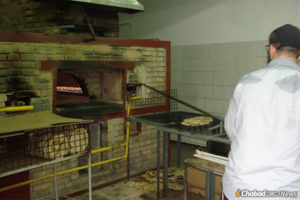As the holiday of Passover rapidly approaches, rabbis and Jewish community members across the globe are navigating the process of procuring holiday essentials, especially matzah, concerned both about its availability and how to safely distribute the matzahs to the millions who are homebound as a result of the coronavirus (COVID-19) pandemic.
Most matzah bakeries have been baking for three to four months already.
The good news? Come what may, this year, like any other, matzah—the traditional round handmade discs and the boxed machine variety—will be widely available.
Shmurah matzah bakeries around the world begin operations in the fall, and with shipments rolling out in the beginning of the year, supermarkets in Los Angeles, New York, London and Australia are fully stocked. Chabad-Lubavitch emissaries who often serve as sole distributors of shmurah matzah in smaller cities and towns have received their stocks as well.
“The challenge at this point is getting it to everyone,” Rabbi Avremi Zippel, program director at Chabad of Utah in Salt Lake City, tells Chabad.org. “Following the guidelines of the local Health Department, a team of volunteers are packing the matzah in full sterile body gear and working on distributing it individually all over town.”
As they do every year, Chabad of Utah placed its matzah order months in advance, long before the coronavirus had become the crisis it is today. Until a few weeks ago, the only wrinkle they had faced was Salt Lake City’s first earthquake in 30 years. Notwithstanding, Utah’s matzah supply arrived on time from Montreal this year like every other.
“Kosher-food industry preparations for Pesach did not begin when the coronavirus panic first set in,” explains Menachem Lubinsky, CEO of Lubicom and an authority on the kosher-food industry. “Factories all over the world began production as early as November and December, as is customary in any given year. Fears of a matzah shortage are also unfounded. Most bakeries have been baking for upward of three to four months, and stores have already received their matzah shipments. Most are not expecting any shortages.”
Matzah Supply Has Grown Over the Decades
Distributing matzah this week in Dimona, Israel. As stringencies increase, Tzeirei Agudat Chabad, the movement’s umbrella organization in the Israel, has partnered with the central matzah bakery in Kfar Chabad and the national post to ensure that matzah still gets to where it needs to go.
Rabbi Meyer Stambler, a Chabad emissary in Dnipro (formerly Dnepropetrovsk), Ukraine, is a major player in the international shmurah matzah industry. In addition to his role as a Dnipro rabbi, Stambler heads his family’s two large-scale matzah bakeries—one in Kfar Chabad, Israel, and another locally, in Ukraine. Together, these two bakeries produce 15 percent of the global shmurah matzah supply, amounting to millions of kilos of matzah.
Once nearly lost to history, round shmurah matzah has become a globally available Passover staple in the last 60 years. The change in trajectory can be traced back to the early 1950s, when the Rebbe—Rabbi Menachem M. Schneerson, of righteous memory—called on all Jews to distribute the special matzah to their friends, family and acquaintances in their community. Back then, there were only a handful of mom and pop shmurah matzah bakeries, but as the matzah grew in popularity, so did demand. By now, shmurah matzah factories can be found around the world, and the smoky discs they produce are available in synagogues and supermarkets from Moscow to Melbourne.
The Stambler’s bakery in Israel, founded in the village of Kfar Chabad in the 1950s, is today a large, modern facility with a large operations hall. Usually, the bakery gives tours to thousands of Israeli schoolchildren and other tourists, although obviously all that has long been called off. The bakery in Ukraine, called Tiferet Hamatzot, was started in 2006, and together they are one of the largest distributors across the world.
Operations at both factories, says Stambler, have been humming along since November. That means that thankfully, the vast majority of the global supply was already baked, packed and shipped before the impact of COVID-19 was felt.
“Thank G d, the last truck of matzah we sent to Italy left before Purim,” adds Stambler. “Italy is experiencing a tragedy; for them to have the ‘food of faith’ and ‘food of healing,’ as matzah is called, is more important now than ever.”
Shipments to the United States, which has multiple bakeries of its own, all left a while ago, and so Stambler says the North American matzah supply is likewise stable.
Some parts of Western Europe have proven to have difficulties, but not because of supplies.
“France has strict rules of not allowing more than 10 people to congregate, so people in Paris stood on line to get shmurah matzah for hours. I was told that some customers came back three days in a row until they finally got their matzah,” Stambler reports.
While much of the matzah has already been shipped, during these weeks before Passover matzah bakeries, including Stambler’s, are busily baking away to add to the available supply, all while strictly following up advanced food safety protocol in place under the current circumstances.
Home Deliveries on Track
Mindful of government regulations, a rabbinical student distributes matzah to an Israeli teenager in Netanya.
While the matzah supply is stable, it’s delivering it to local Jews that has impacted various places differently. Some localities, such as New York State, are under full lockdown orders, although food shopping and delivery is allowed across the board. Alabama, on the other hand, still has no shelter-in-place order. But Rabbi Yosef Goldwasser, co-director of Chabad of Mobile, isn’t taking any chances.
“We’re a small Jewish community, but thank goodness, we got our matzah delivery early this year and didn’t even have to worry,” he says. “But with the recent coronavirus developments, we knew we couldn’t just go about our regular matzah delivery routes; we needed to take the most stringent precautions to protect lives.”
So Goldwasser set up a stand outside his Mobile Chabad center and invited local Jews to pick up their matzah orders one by one, along with other kosher food Chabad brought in bulk from Miami.
“After each pickup, we thoroughly disinfect the table and surrounding area, and invite the next person in,” he explains. “Pickups are with masks and gloves only.”
For those who are isolated or cannot come to pick it up for whatever reason, Goldwasser has been arranging sanitary delivery.
That’s not to say the current climate isn’t presenting challenges along the way.
Like his many colleagues across the world, Rabbi Mendel Loschak of Chabad of Santa Barbara, Calif., placed his Jewish community’s shmurah matzah months ago.
With the onset of the global COVID-19 pandemic, Loschak was concerned about the matzah, so he checked in on the shipment. Sure enough, tracking showed it stuck in transit somewhere in New Jersey.
After making a few phone calls, Loschak discovered that his boxes were marked “holiday items,” and as such, were placed aside in favor of other “essential items.” After explaining to the company that these holiday items were, in fact, “food items,” matters were cleared and the matzahs are back on their way.
Leeds, England, where the Jewish community tragically just lost their longtime rabbinic leader, Rabbi Yehuda Refson, has placed a lockdown on the city, with exemptions for essential workers—religious instructors among them. That has allowed Rabbi Eli Pink of Chabad of Leeds and a team of volunteers to personally deliver shmurah matzah around town.
“We’re determined to make sure people safely get shmurah matzah for the holiday,” he says.
In Israel, matzah to your door
With quarantine in Israel taking on an ever-more stringent nature—the most recent rules, among other steps, ban most people from departing more than 100 meters from their home—Tzeirei Agudat Chabad, the movement’s umbrella organization in the Holy Land, has partnered with the matzah bakery and the national post to ensure matzah still get to where it needs to go.
“One of the important parts of our operation are the smaller packages of three matzot or individual matzot that we produce for people to have for the Seder,” Stambler explains. In past years, these smaller packages have greatly brought down the entry-level cost of shmurah matzah, making them even more accessible to the general public.
In ordinary times, many people purchase these packages to pass on to their friends. This year, although supplies are there, such efforts are understandably impossible, so in recent days, Tzeirei Chabad of Israel has connected with the national post and the bakery to deliver matzah packages to any address in the country.
“You give us a name and address,” says Stambler, “and we’ll deliver it straight to your door.”



